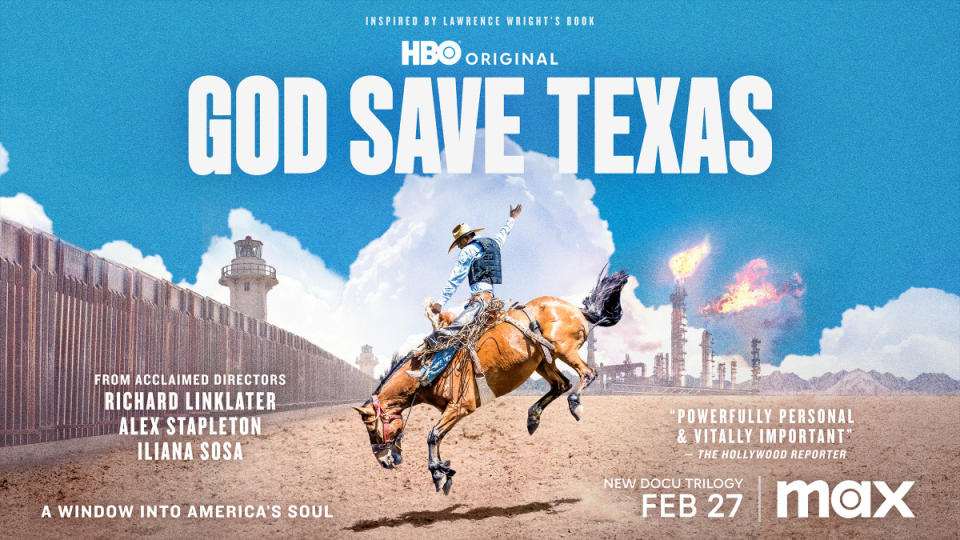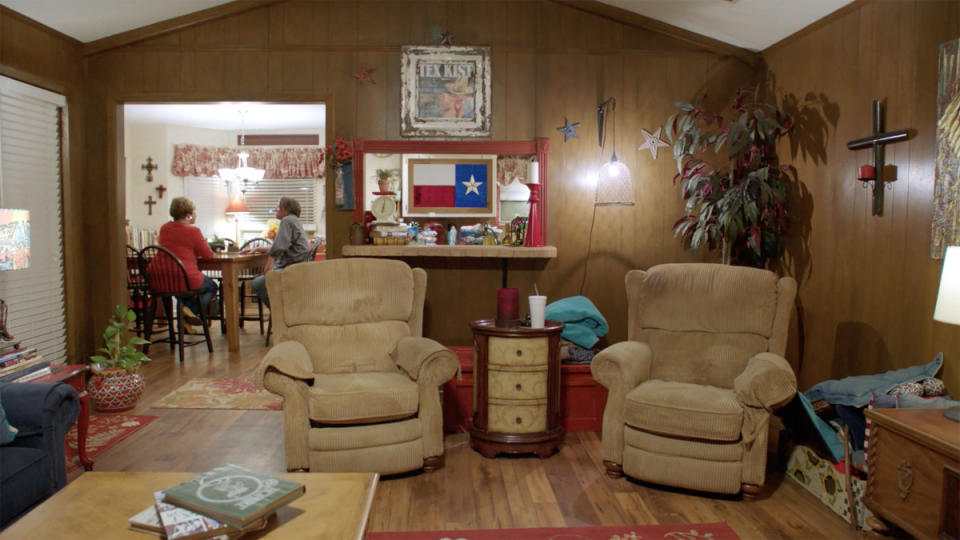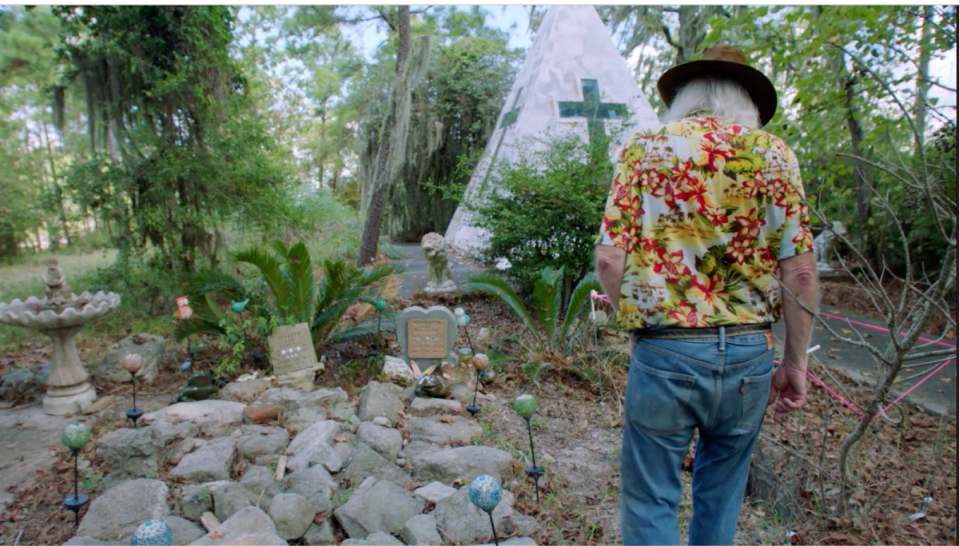Richard Linklater on God Save Texas, Ivan Cantu and Hope
- Oops!Something went wrong.Please try again later.
- Oops!Something went wrong.Please try again later.
God Save Texas is a trilogy of films from three distinct filmmakers designed to chronicle the state's past, present, and future. Hometown Prison, directed by five-time Oscar-nominee Richard Linklater, is the first entry to the series.
We walk alongside him through Huntsville, which upwards of 46,000 members of the Lone Star state call home.
The grounding point of the film is the 54.36-acre prison, which looms large over the city. Behind its red brick and high walls, The Huntsville Unit is home to the most active execution chamber in the United States.
Linklater shows his audience how entwined the system is with each and every person in the city. The options for its residents are limited to working within it, loving someone trapped behind its walls or facing incarceration there yourself.
He holds our hand, guiding us through every angle of this system, painting a complete picture of what it's like and how it feels for prison walls to dominate a city.

HBO / WBD
While he and I sit down to discuss the film, Ivan Cantu sits miles away, encased in the infamous red brick, in a cell just a stone's throw away from the gurney where he is scheduled to take his last breath.
Cantu, who has maintained his innocence for the two decades he has been on Texas' death row, is set to be executed for the fatal shooting of two people, one of them being his cousin.
"I'm so depressed and desperate at this hour," Linklater begins. "Texas has its knee on Ivan Cantu's neck and thousands of people - hundreds of thousands of people - are screaming 'Hey, stop that'.”
This passion is a lifelong fight for Linklater.
God Save Texas: Hometown Prison begins in 2003 with the forty-something director outside of The Huntsville Unit amidst the planned execution of Delma Banks, which eventually led to a stay.
Linklater, now 63 years old, has maintained his fervent fight against the death penalty and holds the weight of it in the same way those whose sole purpose is to push back against its cruelty.
Amidst our conversation, he receives an email from Sister Helen Prejean, whose story was depicted in Dead Man Walking, the film which won Susan Sarandon an Oscar in the year I was born, 1996.
I joined the fight against the death penalty in 2019 after seeing Destin Daniel Cretton's deeply moving and profoundly gracious Just Mercy.
Media can move the needle in cases where the law cannot, but even celebrity-backed campaigns are not always enough to save everybody.

Courtesy of Sundance Institute.
"I think people, in general, are tired of the story. So much so that you can get away with killing an innocent person," Linklater says.
"I think Texas passed the threshold 20 years ago when they executed Cameron Todd Willingham, an innocent guy." Linklater briefly touches on Willingham's story during his film. "We can do this and get away with it,” he continues. “We can just push it, and things become normalized. It happened with the last administration. We just become accustomed to things that we shouldn't."
Linklater is referring to the execution spree that took place during Donald Trump's closing time in office, where he executed 13 people in six months. Something that has never been done before.
During this time, death penalty cases attracted the support of many celebrities, including Kim Kardashian, who fought for Brandon Bernard, a man convicted of killing two youth pastors when he was just 18 years old.
Brandon was the ninth of the 13 to face execution. The four after him were Alfred Bourgeois, Lisa Montgomery, Corey Johnson, and Dustin Higgs.
Their names have largely been forgotten. Despite having tens of thousands of eyes on them at the time, the outrage can only last so long in a world traumatized by the doom scroll on their phones. People can only track so many injustices, and we begin to lose hope as we see the tide push on regardless of all this cruelty.
"The film itself is even hopeful that the death penalty is slowly going away," he says. "But tonight, I can't be hopeful.”
Earlier in our conversation, Linklater said, “It's what happens when you have no accountability. You have a one-party state. You feel like you can operate with impunity and do these kinds of things."
Cantu was still alive and breathing when Linklater and I spoke. But knowing what he knows about the system led by Governor Greg Abbott and District Attorney Greg Willis, Linklater knew the outcome was essentially predetermined.
At 6:47pm on February 28, Cantu was pronounced dead.
"In my mind - if he dies - it's not first-degree murder, but it's negligent homicide,” Linklater tells me just 48 hours before Cantu is killed by the system. “It's felony murder. It's something like that.”.
It’s the system that eats away at Linklater the most. We know our methods of law and control are flawed, yet we’re all bound by the same red brick walls we’ve erected around ourselves as a society.

Courtesy of Sundance Institute.
"My blame was with a system,” he says. "There's a system that does bad things, but we all participate in it, in different ways.”
"I entered this movie not really sure what I thought. I was just feeling my way through it. I had met so many people who had been affected by it needlessly. If we didn't have it, all these people wouldn't have this in their consciousness."
At one point in the film, Linklater uses the "cruel and unusual punishment" argument that many anti-death penalty activists covet. However, he twists it from focusing on the practice to saying that forcing people to participate in the act of execution is cruel and unusual.
"Why are we traumatizing so many more people than the original unfortunate traumatic event? 'Let's just spread the pain and hurt to a wider circle.' That doesn't seem like the right answer to anything…" as Linklater grows more frustrated, his words fizzle out.
He closes the conversation with the same sentiment it opened with: "I'm not hopeful at all. I'm shocked.”
"My movie shows [the system] going backwards. This was gone, and it came back … that's the thing about getting older. You think there's progress being made ... then you say, no, no, actually, there's a real force out there that just wants to go backwards on so many people's fundamental rights."
God Save Texas: Hometown Prison debuted on HBO on February 27, while Greg Abbott and Greg Willis still had time to save Ivan Cantu's life. But, in true Texas fashion, his name joined the list of the 586 other people who have suffered the same fate.
The death penalty thrives from its secrecy. It happens behind walls, on something not dissimilar from a hospital bed, with people somberly watching on as the life leaves a person’s eyes.
Films like God Save Texas: Hometown Prison remind us that no matter how clean the system makes it appear, the practice remains consciously cruel.
Linklater's film may not hold the power to bring back Ivan Cantu or even stop any future executions from taking place in the state, but it will serve as a time capsule. It holds a mirror up to a point in history where cruelty was valued more than truth, and bloodlust was treasured over the wellbeing of the people the state ardently professes to protect.

